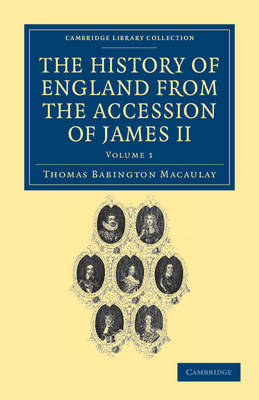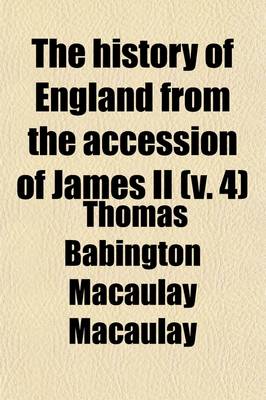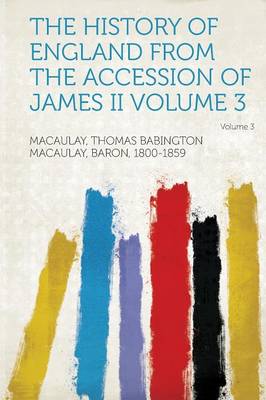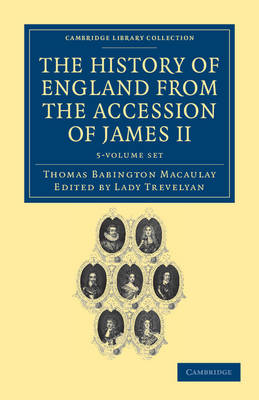Cambridge Library Collection - British & Irish History, 17th & 18th Centuries
1 primary work • 4 total works
Volume 1
The History of England from the Accession of James II
by Baron Thomas Babington Macaulay
Published 10 November 2011
Thomas Babington Macaulay (1800–59) was one of the foremost nineteenth-century historians in the Whig tradition, which saw history as a series of developments towards enlightenment and democracy. He believed that the 'Glorious Revolution' of 1688 had preserved England from the constitutional upheavals suffered by much of Europe in 1848. Using a wider range of sources, including popular literature, than was then usual, and written in an accessible, novelistic rather than academic style, this five-volume work proved hugely influential upon contemporary historians and phenomenally successful with the public, although it was not without its critics. The first two volumes, published in 1848, were by 1849 in their third edition, which is reissued here. Volume 1 examines the constitutional history of Britain up to the Restoration, Charles II's reign, fears of a return to an absolutist monarchy, and Whig attempts to exclude the Catholic James II from the succession.
The History of England from the Accession of James II. (Volume 4)
by Thomas Babington Macaulay and Baron Thomas Babington Macaulay
Published 1 January 2012
Thomas Babington Macaulay (1800-59) was one of the foremost nineteenth-century historians in the Whig tradition, which saw history as a series of developments towards enlightenment and democracy. He believed that the 'Glorious Revolution' of 1688 had preserved England from the constitutional upheavals suffered by much of Europe in 1848. Using a wider range of sources, including popular literature, than was then usual, and written in an accessible, novelistic rather than academic style, this five-volume work proved hugely influential upon contemporary historians and phenomenally successful with the public, although it was not without its critics. Volume 4, published in 1855, covers the period from 1691 to 1697. It deals with war in Europe and continuing trouble in Ireland, where most of the Irish army chose to transfer allegiance to France. It continues with English political affairs, the Bill of Rights and the death of Mary in 1694.
The History of England from the Accession of James II Volume 3
by Thomas Babington Macaulay
Published 2 August 2010
Thomas Babington Macaulay (1800-59) was one of the foremost nineteenth-century historians in the Whig tradition, which saw history as a series of developments towards enlightenment and democracy. He believed that the 'Glorious Revolution' of 1688 had preserved England from the constitutional upheavals suffered by much of Europe in 1848. Using a wider range of sources, including popular literature, than was then usual, and written in an accessible, novelistic rather than academic style, this five-volume work proved hugely influential upon contemporary historians and phenomenally successful with the public, although it was not without its critics. Volume 3, published in 1855, examines the succession of William and Mary, and the constitutional arrangements made for their coronation. It deals with the wars in Ireland and Scotland, and resistance to William in England, particularly among the dissenting clergy.
The History of England from the Accession of James II 5 Volume Set
by Baron Thomas Babington Macaulay
Published 10 November 2011
Thomas Babington Macaulay (1800-59) was one of the foremost nineteenth-century historians in the Whig tradition, which saw history as a series of developments towards enlightenment and democracy. He believed that the 'Glorious Revolution' of 1688 had preserved England from the constitutional upheavals suffered by much of Europe in 1848. Using a wider range of sources, including popular literature, than was then usual, and written in an accessible, novelistic rather than academic style, this five-volume work proved hugely influential upon contemporary historians and phenomenally successful with the public, although it was not without its critics. The first two volumes, published in 1848, were in their third edition by 1849, reprinted here. Because of Macaulay's ill-health and the demands of his political career, the next two volumes did not appear until 1855, and the unfinished fifth volume, edited by his sister Lady Trevelyan, was published posthumously in 1861.



